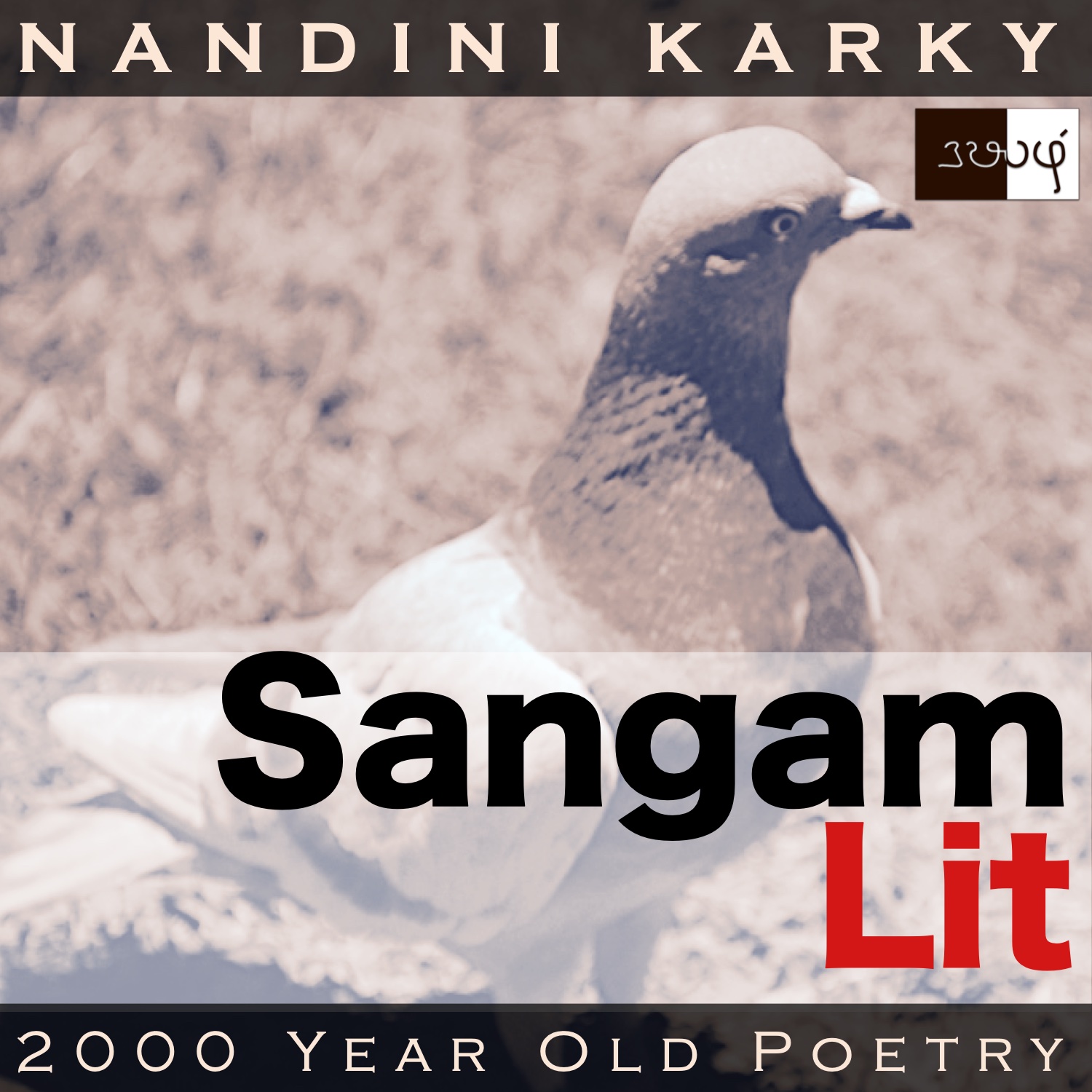Podcast: Play in new window | Download
Subscribe: Apple Podcasts | Spotify | Amazon Music | Android | iHeartRadio | TuneIn | RSS | More

In this episode, we listen to the sorrowful words of a pining lady, as portrayed in Sangam Literary work, Kurunthogai 79, penned by Kudavaayil Keeranakkanaar. The verse is situated in the drylands of ‘Paalai’ and speaks in the voice of the lady to her confidante, expressing her anxiety about the man’s parting away.
கான யானை தோல் நயந்து உண்ட
பொரிதாள் ஓமை வளி பொரு நெடுஞ் சினை
அலங்கல் உலவை ஏறி, ஒய்யெனப்
புலம்பு தரு குரல புறவுப் பெடை பயிரும்
அத்தம் நண்ணிய அம் குடிச் சீறூர்ச்
சேர்ந்தனர்கொல்லோ தாமே-யாம் தமக்கு
ஒல்லேம் என்ற தப்பற்குச்
சொல்லாது ஏகல் வல்லுவோரே.
Dryness and desolation shroud this verse! A ‘jungle elephant’ strides before us in the opening words ‘கான யானை’. Shortly afterwards, we encounter ‘பொரிதாள் ஓமை’, referring to ‘a toothbrush tree with a cracked trunk’. Next, we turn upon hearing ‘a lamenting voice’ as echoed by the phrase ‘ஒய்யெனப் புலம்பு தரு குரல’ and we find ‘a male pigeon calling out to its mate’ in ‘புறவுப் பெடை பயிரும்’. The place where these events are unfolding greets us in ‘அத்தம் நண்ணிய அம் குடிச் சீறூர்’ meaning ‘a beautiful little village in the drylands’. Ending with the words ‘சொல்லாது ஏகல் வல்லுவோரே’ meaning ‘he who was capable of leaving without telling’, the verse seems to hold a significant story within.
From these glimpses, we can perceive plenty of wildlife and parting. To know more, let’s explore the context, which reveals that the man and lady had been leading a happy married life, when the man parted away on a mission. The lady languishes in his absence. One day, she turns to her confidante and says, “The jungle elephant desires and feeds on the bark of the ‘omai’ tree with a splintered trunk. Climbing on to the tall branches of this dry tree, swaying in the wind, the male pigeon lets out a pitiful cry in a suffering-filled voice and calls out to its mate. Such is the scene in a beautiful little hamlet in the drylands. Did he choose to remain there? He, the one, who could part away without telling me, for the fault of saying that I couldn’t bear with his separation!” With these words, the lady is giving word to her worry about the man’s absence.
Time to explore the tiny details in this verse! The lady starts by talking about a jungle elephant chomping on the bark of a tree. This is an ‘omai’ tree, also called as the ‘toothbrush’ tree, for its bark has been used from ancient times in oral hygiene, and contemporary Asians may identify it when referred by the name, ‘miswak’. No doubt, our jungle elephant cares about its smile and is feeding on the tree’s bark relentlessly, leaving it with a fissured base. Requesting that we turn our gaze from the base to the top of the tree, the lady points to the swaying branches and a male pigeon siting alone atop. As we are looking at it, this male pigeon lets out a searing cry of pain calling to its mate. When we look around to spot the female, we see that we are standing in the middle of the drylands in a charming little village. After revealing these scenes, the lady asks if the man has decided to stay back in this drylands village. Before she leaves, she sketches the character of the man saying that the man left her without even telling her, because the lady had previously told him that she could not bear to think of parting with him!
A slight shock can be perceived in the way the lady characterises the man as someone who had the heart to leave without saying bye, and from that, we gather it was a big deal. Even today, in Tamil homes, there is a custom of bidding bye to every single member of the household before leaving that place. Else, it’s seen as a mark of disrespect. Here, the lady describes the man as so hard-hearted that he could leave without even respecting this basic cultural norm. Also, she throws the spotlight on his determination in leaving, thinking that his lady would otherwise stop him from proceeding. So, she laments wondering if he will stay there in the drylands without returning. And yet, in the scene of a male pigeon beckoning its female, she hides the subtle hope that he will be moved by these elements of nature and will rush to be by her side. Illustrating how no question is trivial and no emotion is unessential, the verse paints a rich portrait of these Sangam folks, who seem to have given the mind all the deep attention it deserves!




//these Sangam folks, who seem to have given the mind all the deep attention it deserves!// Loving this line ❤️
Thank you, Subha. Never fails to impress me how mindful they are about the mind.